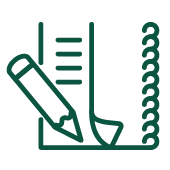You decide how to spend your years. We’ll help you find the right retirement plan to pay for it.
Key Features
-
 Tax Advantages*
Tax Advantages*
-
 Competitive Interest
Competitive Interest
-
 No Setup or Maintenance Fees
No Setup or Maintenance Fees
- Start saving for retirement with tax advantages1
- Competitive interest above standard savings rates
- Traditional and Roth IRA options
- No setup fees
- No monthly or annual maintenance fees
- Annual contribution limits apply (see current contribution limits)1
- Additional "catch-up" contribution maybe allowed for ages 50+1
- $1,000 minimum deposit to open
You can also start saving for college expenses now with our Coverdell Education Savings Account (CESA).
1Consult a tax advisor.
There are advantages to both traditional and Roth IRAs. One of the biggest differences is the time at which you see the most advantage. A traditional IRA provides potential tax relief today, while a Roth IRA has the potential for the most tax benefit at time of retirement.
Traditional IRA
- No minimum contribution requirement
- Contributions are tax deductible on state and federal income tax1
- Earnings are tax deferred until withdrawal
- Withdrawals may begin at age 59½
- Early withdrawals subject to IRS penalty
- Mandatory withdrawals beginning the year you turn age 73
Roth IRA
- Income limits to be eligible to open Roth IRA3
- Contributions are NOT tax deductible
- Earnings are 100% tax free at withdrawal1
- Principal contributions can be withdrawn without penalty1
- Withdrawals on interest may begin at age 59½
- Early withdrawals on interest subject to IRS penalty2
- No mandatory distribution age
- No age limit on making contributions as long as you have earned income
1Subject to some minimal conditions. Consult a tax advisor.
2Certain exceptions apply, such as healthcare, purchasing first home, etc.
3Consult a tax advisor.
- Ideal for businesses of any size or self-employed individuals
- Gain the respect of your employees
- Help employees reach their retirement savings goals
- Employee always has complete ownership of all SEP IRA money
- Earn interest on entire balance $1,000.00 and greater
- Contributions are tax deductible; your business pays no taxes on earnings
- Contributions made only by the employer
- Only self-employed may make contributions on their own behalf
- Little to no documents to file with government
- Inexpensive to set up and operate
- Flexible annual contributions – good plan if cash flow is unpredictable
- Can contribute up to 25% of each participant's annual compensation (earned income)
- Or, up to the maximum allowable limit for current plan year, whichever is less1
- Must contribute equally for all employees
- Employee must first establish a traditional IRA, in which the employer will deposit SEP contributions
- $1,000 minimum deposit to open
1Consult a tax advisor.
